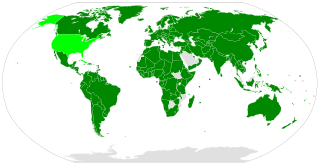| C175 | |
|---|---|
| ILO Convention | |
| Date of adoption | June 24, 1994 |
| Date in force | February 28, 1998 |
| Classification | Arrangement of Working Time |
| Subject | Part-time Working |
| Previous | Prevention of Major Industrial Accidents Convention, 1993 |
| Next | Safety and Health in Mines Convention, 1995 |
Part-Time Work Convention, 1994 is an International Labour Organization Convention for protection of part-time workers including the rights to equal pay for equal work.
It was established in 1994, with the preamble stating:
Recognizing the importance of productive and freely chosen employment for all workers, the economic importance of part-time work, the need for employment policies to take into account the role of part-time work in facilitating additional employment opportunities, and the need to ensure protection for part-time workers in the areas of access to employment, working conditions and social security, and
Having decided upon the adoption of certain proposals with regard to part-time work,...
As of February 2023, the convention has been ratified by 20 states.
| Country | Date | Status |
|---|---|---|
| Albania | 03 Mar 2003 | In Force |
| Australia | 10 Aug 2011 | In Force |
| Belgium | 08 Jun 2016 | In Force |
| Bosnia and Herzegovina | 18 Jan 2010 | In Force |
| Cyprus | 28 Feb 1997 | In Force |
| Finland | 25 May 1999 | In Force |
| Guatemala | 28 Feb 2017 | In Force |
| Guyana | 03 Sep 1997 | In Force |
| Hungary | 09 Apr 2010 | In Force |
| Italy | 13 Apr 2000 | In Force |
| Kazakhstan | 25 May 2022 | Will enter into force on 25 May 2023 |
| Luxembourg | 21 Mar 2001 | In Force |
| Mauritius | 14 Jun 1996 | In Force |
| Netherlands | 05 Feb 2001 | In Force |
| Paraguay | 29 Nov 2021 | In Force |
| Portugal | 02 Jun 2006 | In Force |
| Russian Federation | 29 Apr 2016 | In Force |
| Slovenia | 08 May 2001 | In Force |
| Sudan | 04 Oct 2019 | In Force |
| Sweden | 10 Jun 2002 | In Force |

The International Labour Organization (ILO) is a United Nations agency whose mandate is to advance social and economic justice by setting international labour standards. Founded in October 1919 under the League of Nations, it is the first and oldest specialised agency of the UN. The ILO has 187 member states: 186 out of 193 UN member states plus the Cook Islands. It is headquartered in Geneva, Switzerland, with around 40 field offices around the world, and employs some 3,381 staff across 107 nations, of whom 1,698 work in technical cooperation programmes and projects.
Labour laws are those that mediate the relationship between workers, employing entities, trade unions, and the government. Collective labour law relates to the tripartite relationship between employee, employer, and union.

The European Social Charter is a Council of Europe treaty which was opened for signature on October 18, 1961 and initially became effective on February 26, 1965, after West Germany had become the fifth of the 13 signing nations to ratify it. By 1991, 20 nations had ratified it.
Labor rights or workers' rights are both legal rights and human rights relating to labor relations between workers and employers. These rights are codified in national and international labor and employment law. In general, these rights influence working conditions in relations of employment. One of the most prominent is the right to freedom of association, otherwise known as the right to organize. Workers organized in trade unions exercise the right to collective bargaining to improve working conditions.

The International Covenant on Economic, Social and Cultural Rights (ICESCR) is a multilateral treaty adopted by the United Nations General Assembly (GA) on 16 December 1966 through GA. Resolution 2200A (XXI), and came in force from 3 January 1976. It commits its parties to work toward the granting of economic, social, and cultural rights (ESCR) to the Non-Self-Governing and Trust Territories and individuals, including labour rights and the right to health, the right to education, and the right to an adequate standard of living. As of July 2020, the Covenant has 171 parties. A further four countries, including the United States, have signed but not ratified the Covenant.

Anti-discrimination law or non-discrimination law refers to legislation designed to prevent discrimination against particular groups of people; these groups are often referred to as protected groups or protected classes. Anti-discrimination laws vary by jurisdiction with regard to the types of discrimination that are prohibited, and also the groups that are protected by that legislation. Commonly, these types of legislation are designed to prevent discrimination in employment, housing, education, and other areas of social life, such as public accommodations. Anti-discrimination law may include protections for groups based on sex, age, race, ethnicity, nationality, disability, mental illness or ability, sexual orientation, gender, gender identity/expression, sex characteristics, religion, creed, or individual political opinions.

The International Convention on the Protection of the Rights of All Migrant Workers and Members of Their Families is a United Nations multilateral treaty governing the protection of migrant workers and families. Signed on 18 December 1990, it entered into force on 1 July 2003 after the threshold of 20 ratifying States was reached in March 2003. The Committee on Migrant Workers (CMW) monitors implementation of the convention, and is one of the seven UN-linked human rights treaty bodies. The convention applies as of October 2022 in 58 countries.
The Vienna Declaration and Programme of Action (VDPA) is a human rights declaration adopted by consensus at the World Conference on Human Rights on 25 June 1993 in Vienna, Austria. The position of United Nations High Commissioner for Human Rights was recommended by this Declaration and subsequently created by General Assembly Resolution 48/141.
The Right to Organise and Collective Bargaining Convention (1949) No 98 is an International Labour Organization Convention. It is one of eight ILO fundamental conventions.
Maternity Protection Convention, 2000 is an International Labour Organization Convention.
The Convention concerning Equal Remuneration for Men and Women Workers for Work of Equal Value, or Equal Remuneration Convention is the 100th International Labour Organization Convention and the principal one aimed at equal remuneration for work of equal value for men and women. States parties may accomplish this through legislation, introduction of a system for wage determination and/or collective bargaining agreements. It is one of 8 ILO fundamental conventions.
Workers with Family Responsibilities Convention, 1981 is an International Labour Organization Convention.
Employment Promotion and Protection against Unemployment Convention, 1988 is an International Labour Organization Convention to promote employment especially vocational guidance, training and rehabilitation, offer the best protection against the adverse effects of involuntary unemployment, but that involuntary unemployment nevertheless exists and that it is therefore important to ensure the social security systems should promote employment assistance and economic support to those who are involuntary unemployed.
Home Work Convention, created in 1996, is an International Labour Organization (ILO) Convention, which came into force in 2000. It offers protection to workers who are employed in their own homes.
United Kingdom agency worker law refers to the law which regulates people's work through employment agencies in the United Kingdom. Though statistics are disputed, there are currently between half a million and one and a half million agency workers in the UK, and probably over 17,000 agencies. As a result of judge made law and absence of statutory protection, agency workers have more flexible pay and working conditions than permanent staff covered under the Employment Rights Act 1996.

The Convention on the Rights of Persons with Disabilities is an international human rights treaty of the United Nations intended to protect the rights and dignity of persons with disabilities. Parties to the convention are required to promote, protect, and ensure the full enjoyment of human rights by persons with disabilities and ensure that persons with disabilities enjoy full equality under the law. The Convention serves as a major catalyst in the global disability rights movement enabling a shift from viewing persons with disabilities as objects of charity, medical treatment and social protection towards viewing them as full and equal members of society, with human rights. The convention was the first U.N. human rights treaty of the twenty-first century.

The Convention on Domestic Workers, formally the Convention concerning Decent Work for Domestic Workers is a convention setting labour standards for domestic workers. It is the 189th ILO convention and was adopted during the 100th session of the International Labour Organization, in 16 June 2011. It entered into force on 5 September 2013.
International labour law is the body of rules spanning public and private international law which concern the rights and duties of employees, employers, trade unions and governments in regulating Work and the workplace. The International Labour Organization and the World Trade Organization have been the main international bodies involved in reforming labour markets. The International Monetary Fund and the World Bank have indirectly driven changes in labour policy by demanding structural adjustment conditions for receiving loans or grants. Issues regarding Conflict of laws arise, determined by national courts, when people work in more than one country, and supra-national bodies, particularly in the law of the European Union, has a growing body of rules regarding labour rights.
The right to sit refers to laws or policies granting workers the right to be granted suitable seating at the workplace. Jurisdictions that have enshrined "right to sit" laws or policies include the United Kingdom, Jamaica, South Africa, Eswatini, Tanzania, Uganda, Lesotho, Malaysia, Brazil, Israel, Ireland, the Indian states of Tamil Nadu and Kerala, the Canadian province of Newfoundland and Labrador, and the British overseas territory of Gibraltar and Montserrat. Almost all states of the United States and Australia, as well as the majority of Canadian provinces passed right to sit legislation for women workers between 1881 and 1917. US states with current right to sit legislation include California, Florida, Massachusetts, Montana, New Jersey, New Mexico, New York, Oregon, Pennsylvania, West Virginia, and Wisconsin. A right to sit provision is included in the International Labour Organization's Hygiene Convention, 1964; the convention being ratified by 51 countries as of 2014. Local jurisdictions with right to sit laws include Portland, Oregon, St. Louis, Missouri and London's Royal Borough of Kensington and Chelsea. Some jurisdictions, such as Alabama, Arkansas, Connecticut, Idaho, Kentucky, Maine, Michigan, Missouri, Nevada, New Hampshire, Quebec, and Washington, D.C. have revoked their right to sit laws. Many right to sit laws originally contained gendered language specifying women workers only. Some jurisdictions maintain gendered laws, but many jurisdictions have amended their right to sit laws to be gender neutral.